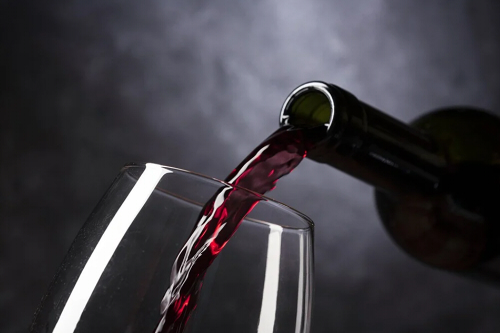Alcohol in Swedan
瑞典的葡萄酒
Most northern-hemisphere wine is produced at a latitude of between 30° and 50°. Any farther north and it gets too cold. Ahus vineyard, in Skane county on Sweden’s Baltic coast, is at a chilly 55.9°. But since 2005 it has been cultivating vines on a hectare of farmland. Last year it produced around 3,000 bottles, mostly from solaris grapes, a variety suited to cooler climes. It also welcomes tourists. This summer saw a rush of interest from Swedish oenophiles holidaying at home because of the pandemic. Visitors would ask, “Can we buy a bottle as a souvenir?” says Karin Birch, who helps run the vineyard. “And I would have to say no.”
北半球大部分葡萄酒是在北纬30°到50°之间的地区生产的,如果再往北就太冷了。阿赫斯葡萄园位于瑞典波罗的海沿岸的斯科纳省,该地纬度为55.9°,气温十分寒冷。但从2005年开始,那里的人们就在一公顷的农田上种植葡萄。去年葡萄园生产了大约3000瓶酒,这些酒大部分是用索莱莉葡萄酿造的。这一葡萄品种适合在寒冷气候下生长。葡萄园也欢迎游客的到来。瑞典的葡萄酒行家在今年夏天对庄园产生了浓厚兴趣。由于疫情原因,他们只能在国内度假。游客会问:“我们可以买一瓶酒作为纪念品吗?”帮忙经营葡萄园的卡琳·伯奇说:“而我不得不拒绝。”

In 1955 Sweden replaced a rationing system so ineffective that even the temperance movement opposed it with a state monopoly on alcohol sales. Today 446 shops called Systembolagets are the only places where Swedes can buy alcohol stronger than 3.5%, besides bars and restaurants. Similar monopolies exist in other Nordic countries, and the arrangement remains broadly popular.
瑞典在1995年用国家垄断酒精销售的方式替代了配给制,原先的配给制是如此无效,以至于连禁酒运动都反对它。如今除了酒吧和餐馆外,瑞典人唯一能买到酒精度超过3.5%的地方就只有名为Systembolagets的酒类专营店了(这些店一共有446家)。类似的经营垄断在其他北欧国家也存在,而且这样的销售方式仍然广泛流行。
The state’s grip on booze sales may be about to weaken, however. Last year, in exchange for propping up the minority government, the moderate Centre Party negotiated a consultation on the introduction of “farm sales”. The policy would allow producers such as Ahus to sell directly to customers. But the idea is controversial.
不过,瑞典对酒类销售的掌控能力接下来可能会减弱。去年,为了换取对少数派政府的支持,温和的中心党就引入“农场销售”政策进行了协商。该政策将允许阿赫斯这样的生产商直接向客户销售酒饮,但这一想法仍有争议。
The IOGT-NTO, a Swedish temperance movement, claims that farm sales are a Trojan horse that will end up letting big producers flog their wares on the open market, noting that the Swedish farmers’ association has argued against putting a size limit on sales. Opponents also argue that farm sales could be illegal under European Union law, though this has yet to be tested. In 1997, two years after Sweden joined the bloc, the European Court of Justice ruled that the monopoly complied with the EU’s rules on the free movement of goods, since it did not discriminate against any producers. But farm sales would by their nature exclude alcohol from abroad.
瑞典禁酒运动组织IOGT-NTO声称,农场销售政策只是个幌子,它最终会导致大的生产商在公开市场上兜售自己的商品。该组织指出瑞典农民协会一直反对对销售规模进行限制。反对者还认为,根据欧盟法律,农场销售可能是非法的,不过这还有待检验。欧盟法院在1997年(瑞典加入欧盟两年后)裁定,瑞典对于酒精销售权的垄断符合欧盟关于货物自由流通的规则,因为它没有歧视任何生产商。但农场销售从本质上讲会将国外的酒类排除在外。
According to Sofia Nilsson, a Centre Party MP for Skane, farm sales are not a way to abolish the state’s monopoly by the back door, but could boost tourism and jobs in the countryside. The government consultation will take time, but Ms Nilsson is optimistic: “I really hope that in a couple of years we can cycle around Skane, stop at a vineyard and buy a bottle of wine for dinner.”
斯科纳的中心党议员索菲亚·尼尔森认为,农场销售并不是通过走后门来取消国家垄断,而是可以促进乡村旅游业和就业。政府的协商需要时间,但尼尔森女士很乐观:“我真心希望几年后我们能骑车环绕斯科纳,在葡萄园停下来并且买一瓶葡萄酒佐餐。”
英文、中文版本下载:http://www.yingyushijie.com/shop/source/detail/id/2558.html








